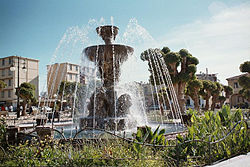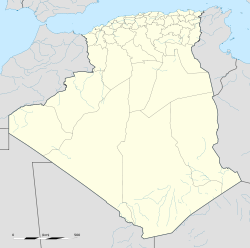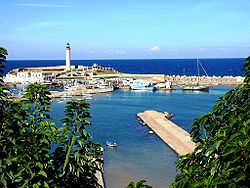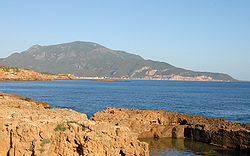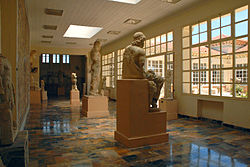- Cherchell
-
"Iol" redirects here. For other uses, see IOL (disambiguation).For the British village formerly called Cherchell, see Churchill, Oxfordshire.
Cherchell
شرشالCherchell's fountain place 
SealCoordinates: 36°36′36″N 2°11′48″E / 36.61°N 2.19667°ECoordinates: 36°36′36″N 2°11′48″E / 36.61°N 2.19667°E Country Algeria Province Tipaza District Cherchell Cherchell (older Cherchel, Arabic: شرشال) is a seaport town in the Province of Tipaza, Algeria, 55 miles west of Algiers. It is the district seat of Cherchell District. As of 1998, it had a population of 24,400.[1]
Contents
Ancient history
The Phoenicians of Carthage settled at Cherchell in the 4th century BC and named the town Iol or Jol. The town became a part of the kingdom of Numidia under Jugurtha, who died in 104 BC. The town became very significant to the Berber monarchy and generals of Numidia. The Berber Kings Bocchus I and Bocchus II lived there, as occasionally did other Kings of Numidia. Situated in an area called Mauretania, which was apart of the Numidian kingdom.
The last Numidian king Juba II and his wife, the Greek Ptolemaic princess Cleopatra Selene II were forced to flee the other part of Numidian kingdom because the local population disapproved of their king being too Romanized, which caused civil unrest between 26 BC-20 BC. Roman Emperor Caesar Augustus had intervened in the situation and divided the Numidian Kingdom into two. One half of the kingdom became a part of the Roman province of Africa Nova. Western Numidia and Mauretania (the second half of the kingdom) became one kingdom. Iol was renamed Caesaria or Caesarea, in honor of the emperor. Caesaria would become the capital of the Roman client kingdom of Mauretania. The kingdom of Mauretania became one of the important client kingdoms in the Roman Empire, and their monarchs were one of the most loyal client monarchs that served Rome.
Juba and Cleopatra did not just rename their new capital, but rebuilt the town in fine Roman style on a large, lavish and expensive scale. The construction and sculptural projects in Caesaria and throughout the kingdom were built on a rich mixture of ancient Egyptian, Greek and Roman architectural styles. The monarchs are buried in their mausoleum, the Royal Mausoleum of Mauretania which can still be seen. The seaport capital and its kingdom flourished until 40, when its last monarch Ptolemy of Mauretania was murdered on a visit to Rome.
In 44 after a four year bloody revolt, the Roman Emperor Claudius divided the Mauretanian kingdom into two provinces. Caesaria became the capital of Mauretania Caesariensis, one of the two provinces. Claudius gave Caesaria two names: the capital Caesariensis while the town became the a Roman colony Colonia Claudia Caesarea. The town was the birthplace to the Roman Emperor Macrinus and Greek grammarian Priscian. From 314 to 484, four titulars and one Donatist served the local Christian community. Caesaria was also the birthplace of Catholic Saint, Marciana (her feastday is on 9 January). This virgin martyr was accused of vandalizing a statue of the goddess Diana. After being tormented, Marciana was gored by a bull and mauled by a leopard in the amphitheatre at Caesaria. In the 5th century, the Vandals burnt the town, but it was recaptured under the Byzantine Emperor Justinian I, restored, and returned to its previous level of importance.
Modern history
The Arabs in the 8th century conquered Algeria and introduced Islam to the country. In the local Berber dialect, gradually replaced by Arabic, the original name of the town, Caesaria, evolved into Sharshal. Cherchell is the French spelling of the contemporary Arabic/Berber name of the town.
Under Turkish occupation the town, became infested by pirate invasions, but this was gradually brought under control by European navies (particularly the French Navy). In 1520, Hayreddin Barbarossa captured the town and annexed the Algerian Pashalic. His elder brother Oruç Reis had built a fort over the town, and this fort was completely destroyed during the French occupation.
In 1738, a terrible earthquake shook the town. In 1840, the French had captured and occupied the town. The French built monuments in the town. During archaeological excavations, many ancient statues were either left in Cherchell, or taken to museums in Algiers or Paris, France. From the building projects of the French, ancient buildings have been damaged. Dress stones from the Roman amphitheatre were used to the build the barracks and materials from the Hippodrome were used to build the church. The steps of the Hippodrome were partly destroyed by Cardinal Charles Lavigerie in a search for the tomb of Saint Marciana.
During World War II, Cherchell served as a base for the US army, hosting a summit conference between the US and UK in October 1942. Cherchell has around 60,000 inhabitants. Cherchell has industries in marble, plaster quarries and iron mines. The town trades in oils, tobacco and earthenware. The ancient cistern still supplies water to the town.
Cherchell is one of the most popular tourist places in Algeria. Cherchell has various splendid temples and monuments from the Punic, Numidian and Roman periods, and the works of art found there, including statues of Neptune and Venus, are now in the Museum of Antiquities in Algiers. The former Roman port is no longer in commercial use and has been partly filled by alluvial deposits and has been affected by earthquakes. The former local mosque of the Hundred Columns contains 89 columns of diorite. This remarkable building now serves as a hospital. The local museum displays some of the finest ancient Greek and Roman antiquities found in Africa. Cherchell is the birthplace of writer and movie director Assia Djebar.
Historical population
Year Population[1] 1901 9,000 1926 11,900 1931 12,700 1936 12,700 1954 16,900 1966 11,700 1987 18,700 1998 24,400 References
- 2002 Microsoft Encarta Encyclopaedia.
- Children's Britannica - Volume 1, Abbey to Arabs, Algeria
- S. Pétridès (1908). "Caesarea Mauretaniae". Catholic Encyclopedia. http://www.newadvent.org/cathen/03134a.htm.
- "Cherchell". Encyclopædia Britannica. 1911. http://www.1911encyclopedia.org/Cherchel.
- ^ a b populstat.info
External links
- Various ancient ruins of Cherchell:
Capital: TipazaDistricts 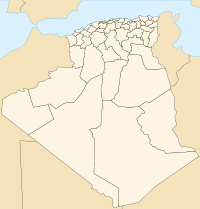
Communes · Aghbal · Ahmar El Ain · Ain Tagourait · Attatba · Beni Milleuk · Bou Ismaïl · Bouharoun · Bourkika · Chaiba · Cherchell · Damous · Douaouda · Fouka · Gouraya · Hadjeret Ennous · Hadjout · Khemisti · Kolea · Larhat · Menaceur · Messelmoun · Meurad · Nador · Sidi Amar · Sidi Ghiles · Sidi Rached · Sidi Semiane · TipazaCategories:- Populated places in Tipaza Province
- Communes of Algeria
Wikimedia Foundation. 2010.

